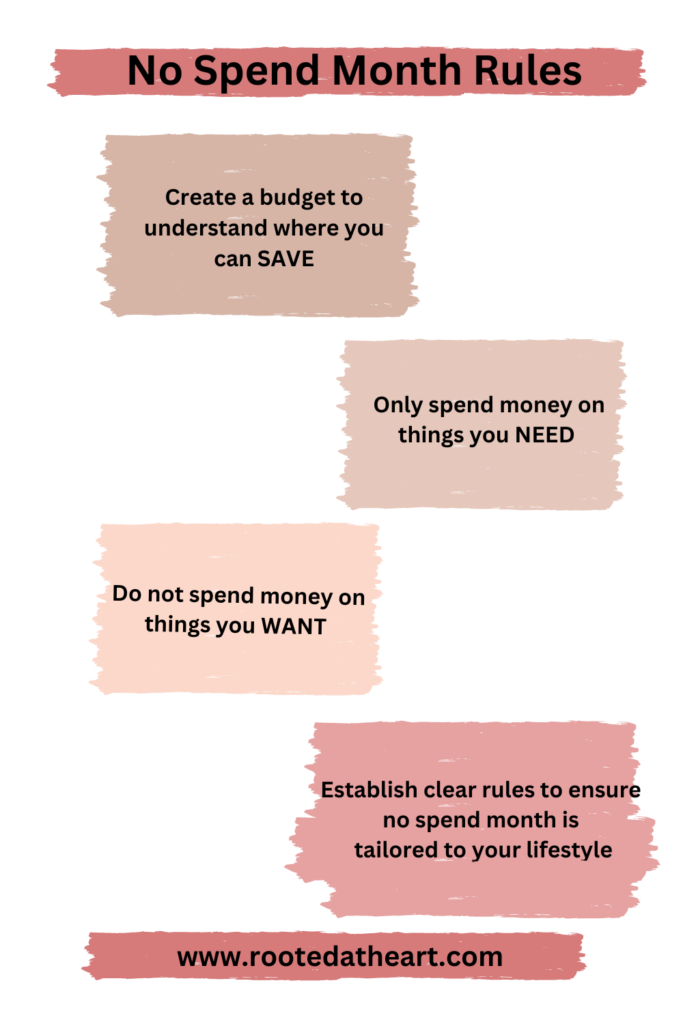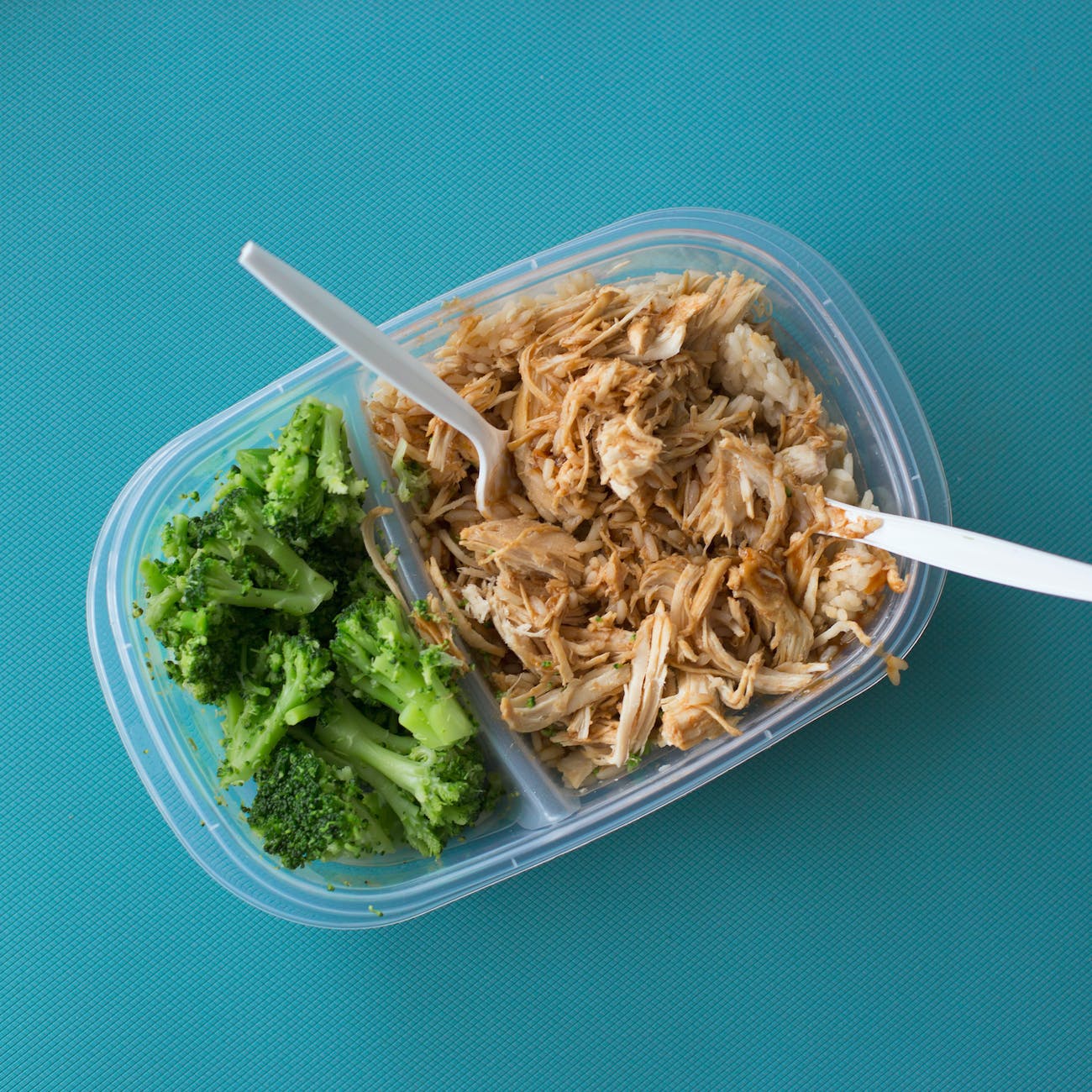A few months ago my husband challenged our family to a ‘no spend’ month and we saved $3,323 in ONE month. For one month we committed to not spending any money outside of the essentials to keep our household functioning. A no spend month is not for the faint of heart, do you have what it takes to complete this financial challenge?
A no spend month resulted in a nice bump in our bank account, revealed passions for new hobbies, allowed us to sell a bunch of “junk” sitting around in our home and set the precedent for what purchases really matter.

What is a ‘no spend’ month?
A ‘no spend’ month is exactly as it sounds. It is a challenge completed for one calendar month (or thirty days), where one restricts their purchases on everything except the essentials. This means no purchases are made outside of items for survival (aka ‘needs’): food, bills, mortgage, gas / transportation.
The only time this ‘rule’ of a no spend month would be broken is if there was an emergency (surprise medical bill, accident, unexpected expense – IE car broke down). This also means no purchases go towards ‘wants’ like coffee or meals on the go, clothing, date nights, or spontaneous Amazon purchases.
The traditional length of a no spend month is thirty (30) days, though one can increase or decrease the challenge as necessary. Some may even take the financial challenge up for up to a year in one budgeted category!
The recommended length is a full calendar month as it is a bit more challenging than a shorter spending freeze of a day or week long. It requires some planning and discipline while helping to both break habits and encourage new ones.
As a result, this spending freeze is a great way to jumpstart financial growth, reduce spontaneous spending and allow one to build their bank account by changing the way they think about money.
Why should someone complete a ‘no spend’ month?

Making the decision to complete a no spend month can occur for a variety of reasons. This is often thought of as the ‘why’ and is reason for choosing to restrict or freeze all spending unless it is towards a necessary purchase. Each person’s why will be different, though some motivations remain the same including:
- Paying off debts (including credit cards)
- Reduce expenses
- Reach goals of financial freedom and growth
- Re-evaluate spending and motivations behind money
- Help recognize and reduce impulse buys
- Challenge the mind
- Break money spending habits and start saving more
- Encourage communication between members of the household to think about finances differently (and work together to meet those goals)
- Eat out less meals and cook more at home
- Clean out the pantry and use up items are already on hand (IE shelf cooking)
- Save money for a trip, vacation or reward
- To say ‘I did this’!
Our personal reasons for having a no spend month this April was because we felt like all we did was ‘spend, spend, spend’ for the first three months of the year. Our home is not old, though it did need some updated applicances at the beginning of the year.
When our dishwasher unexpectedly broke in January, we made it one month of washing everything by hand before laying down $1,000 on the major life upgrade. Our washing machine was on the fritz in February.
We did not want to buy a washer without upgrading the dryer too, so we laid down a good $2,000 (even on a Costco deal). And then my phone broke.
Additionally, we like a challenge. Knowing we have financial goals, some for choice rather than necessity, we wanted to save up some money as quickly as possible.
One goal is to start saving to take a nice vacation around our five year wedding anniversary. We were unable to take a honeymoon when we got married (thanks 2020!) and set our five year goal – Hawaii anyone?
God willing, we would also like to expand our family which means upgrading one of our vehicles and having some more medical bills for check ups and hospital bills.
Though we have insurance, having a little one is expensive especially because I have additional health scans due to my congenital heart defect!
And finally, we have some house projects like building a new deck, buying deck furniture, buying chickens and making a chicken coop and building a new mailbox (which could fall off the post at any moment).
As you can see from our personal examples, there is not one specific reason for having a no spend month, though it certainly is enjoyable to reap the benefits when it is all over.
How much money we saved
We saved a whopping $3,323 during the no spend month challenge! Though results will vary for every individual completing this no spend month challenge, we saw the benefits across all budget categories.
Our largest savings came from food which was over $200 lower than an average month. Our smallest savings was our energy bill where we saved a few dollars by turning off the lights early and often.
We saved $1,000 more than a normal month and began heading full force into our side hustles to start generating additional income.
Complete a No Spend Month in seven steps

There are multiple ways to get started on a no spend month.
First, create a basic budget!
If you do not know what you are spending, it is hard to know where (and how much) you can save. There are plenty of methods on how to create a budget. Our favorite way (and how we paid off a couple thousand dollars of debt), is the ‘zero dollar’ budget.
A zero dollar budget means all money has a place. Basically, all income is divided between expenses and savings. If money is not put towards an expense, it is put into savings. This leaves ‘zero dollars’ at the end of the month.
There are a few apps available like EveryDollar to track finances. Stay tuned for future budget templates and a no spend month challenge I will be launching soon!
Second, create a set of rules.
Set these around the basics of a no spend month.

For example:
- Create a budget to understand where you can save
- Only spend money on things you need
- Do not spend money on things you want
- Establish clear rules to ensure no spend month is tailored to your lifestyle
Another example could include specific rules like:
- No food and beverages outside the house
- No dining out, no drive thru, no coffee on the go, no drinks at the bar
- Re-evaulate (or cancel) subscriptions
- Remove credit card from phone to avoid spontaneous spending
- No shopping (except for groceries)
Third, develop a meal plan.
Create a weekly meal plan to prepare meals in advance. A meal plan will help reduce the temptation to order take out or purchase drive thru meals. Ideas for a meal plan can include:
- Plan each meal breakfast, lunch and dinner and snacks in advance
- Plan for family meals at least once daily and plan the rest on the go
- For many families a meal together is typically breakfast or dinner.
- Plan to eat any meal to be consumed outside the home in advance. Breakfast may be overnight oatmeal and cheese sticks. Lunch may include sandwiches, chips and protein shakes. Dinner may be a sourdough skillet or burritos to go.
- Use what you have on hand first. Go through the freezer and pantry to create meals revolving around one item. This month is also a great time to get rid of any expired items within your cupboards, fridge and freezer.
- The website ‘Shelf Cooking‘ has a variety of tips and tricks to implement this method of creating meals with what is already on hand.
Additional ways to save money on groceries include the following:
- Use coupons
- Follow weekly ads and sales at local stores
- Sign up for loyalty programs at grocery stores
- Download a grocery money saving app like ‘FlashFood‘ to see what foods are marked down at your local store each week. #momtomomtip: Use my code ‘HAIL3STJX’ to receive $3 on your next order when you spend over $15 on your first purchase! By using this code I will also receive $3 towards my next purchase with FlashFood- thank you!
Fourth, remove credit card from phone.
To reduce impulse buys, consider removing any credit cards you have saved onto your phone. While handy when making late night purchases or when a credit card is not nearby, this feature leads to spontaneous purchases.
Because cell phones have a ‘remember my card’ feature to help make purchasing items easier, it makes decisions a little too close to the fingertips. To take this action item a step further, consider removing the applications like Target, Amazon and Etsy to avoid browsing for the month.
Fifth, enlist a support system.

Recruit family and friends to help keep you motivated and hold you accountable for the entire no spend month. This support system will be your ‘go to’ when there is a purchase you are contemplating or motivation is low.
Have them know the start and end date of your journey. This, along with your why, can be the reason the no spend month challenge is complete! There is also power in numbers, so ask them to join you on the no spend month challenge!
Sixth, remember your ‘why’.
As mentioned previously, it is important to remember the purpose of the no spend month challenge. There is nothing to lose by starting a 30 day money challenge and so much to gain.
Post this ‘why’ throughout your home by leaving notes. Similarly, schedule an automatic reminder on your phone to pop up each day, or throughout each week.
Seventh, plan for one ‘cheat’.
Remember, surprises and mistakes happen. This can give a little buffer when things get tough and you need to build back up the motivation to complete the challenge. Additionally, it will help remove any ‘shame’ which can come along with slipping up.
A ‘cheat’ can be as simple as getting one cup of coffee, a drink with a friend who has not been in town for a while, or a meal on the go when you forgot to grab breakfast out of the fridge on the way to taking the children to childcare.
Just remember to set the limit in advance and use this step to help you get back on track.
Are you ready to take the no spend month challenge?
Should you choose to take the next step in starting a no spend month challenge, congratulations! Again, this is no easy task.
With a little planning and direction, a lot of success can occur as a result. After all, we are here to save you time and money! Comment below, when are you going to start your no spend month challenge?







I am really inspired with your writing abilities and also with the
structure for your weblog. Is that this a paid topic or did
you customize it yourself? Either way stay up the excellent quality writing, it’s rare to look a great weblog
like this one these days..
Thank you for your comment! Everything on this specific blog post is my own writing and not sponsored.
Hello, just wanted to tell you, I enjoyed this blog
post. It was helpful. Keep on posting!
Thank you! Let me know if you try out a no spend month!